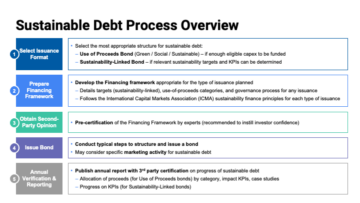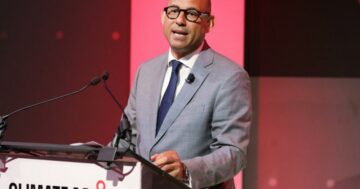
IKEA, Iberdrola, and Unilever are among 27 companies deemed to be the strongest corporate advocates for ambitious climate policy worldwide, according to fresh research from InfluenceMap.
An annual ranking of the world’s top corporate climate policy engagement leaders by the London-based NGO lists identifies 27 firms globally that have met all three of its criteria for organization, engagement intensity and industry influence. But it also warns that far too many corporates still remain sat “on the sidelines” when it comes to climate policy debates, allowing fierce fossil fuel industry lobbying to wield an outsize influence over policymakers.
The report highlights how a majority of the leading climate policy “trailblazers” are based in Europe, including consumer goods giant Unilever, energy suppliers SSE and EDF, Danish green energy developer Ørsted, Swedish fashion retailer H&M, Dutch chemicals giant DSM-Firmenich, Swiss food multinational Nestlé and French construction materials manufacturer Saint-Gobain.
The list is rounded out by six companies from Japan — including Sony, Ricoh, and Softbank — as well as five U.S. firms, including tech giants Salesforce and Apple as well as heating, ventilation and air conditioning manufacturer Trane Technologies.
InfluenceMap assessed the advocacy and lobbying activities of almost 500 leading companies worldwide, concluding that a growing number are demonstrating various aspects of climate policy leadership.
However, it warned that despite the private sector holding “huge sway” over climate policy, most companies outside the fossil fuel value chain “remain largely on the sidelines” and are failing to prioritize climate policy in their government engagement and advocacy activities.
It also accused many firms of failing to robustly address the negative climate policy influence exerted by some industry associations of which they are members.
Lead author of the study Kendra Haven, projects director at InfluenceMap, stressed the crucial role global companies can play in encouraging governments to align domestic policies with the goals of the Paris Agreement.
“Without corporate leadership, governments are unlikely to undertake decisive policy interventions that are the need of the hour,” she said. “Our analysis shows who the trailblazers are in climate policy advocacy and demonstrates the overall growth in climate policy engagement leaders since 2021.”
To secure a place at the top of InfluenceMap’s rankings, companies must align their climate policy advocacy with science-based pathways for delivering the goals of the Paris Agreement, in addition to actively engaging with policymakers in support of those targets.
Companies found to have demonstrated “highly negative” indirect influence on climate policy through industry associations with no formal disclosure of their efforts to address such misalignment with their own corporate climate goals were excluded from the list.
A further 17 firms were found to have met a number of the key criteria for inclusion in the top ranking list, but failed to transparently and robustly address issues arising from their trade association membership, InfluenceMap explained.
The findings come amid growing pressure on major corporates to use their sizable influence to push for stronger climate policies in the run up to the COP28 Climate Summit in Dubai, where fossil fuel firms and industry lobby groups are expected to have a significant presence.
Speaking to BusinessGreen earlier this month, Forum for the Future CEO Sally Uren urged companies to avoid so-called “greenhushing,” and to instead speak openly and honestly about the urgent need for more ambitious decarbonization policies from governments to drive the net zero transition.
“Governments around the world need to hear from the private sector and the private sector needs to be really clear what it needs from government and policy makers,” she said.
Commenting on the findings from InfluenceMap, Climate and Nature Solutions CEO Catherine McKenna — chair of the U.N. Secretary-General’s High Level Expert Group on corporate net zero commitments, and Canada’s former environment and climate change minister — urged more businesses to lobby for ambitious climate policies and the phase out of fossil fuels at the upcoming COP28 Climate Summit in November.
“As we approach another COP meeting and the climate crisis continues to worsen, private sector support for meaningful national level climate policy is needed more than ever,” she said. “But the biggest barrier to action is the fossil fuel sector. The research shows consistent and persistent efforts to delay ambitious government climate policies by fossil fuel companies and those who support them.”
A growing number of corporates are lobbying harder than ever before for bolder climate policies, but the report again underscores how they need more allies to join them if they are to push back against the decades of influence enjoyed by the fossil fuel industry.
- SEO Powered Content & PR Distribution. Get Amplified Today.
- PlatoData.Network Vertical Generative Ai. Empower Yourself. Access Here.
- PlatoAiStream. Web3 Intelligence. Knowledge Amplified. Access Here.
- PlatoESG. Carbon, CleanTech, Energy, Environment, Solar, Waste Management. Access Here.
- PlatoHealth. Biotech and Clinical Trials Intelligence. Access Here.
- Source: https://www.greenbiz.com/article/how-climate-policy-advocates-are-getting-sidelines
- :is
- :where
- $UP
- 17
- 2021
- 27
- 500
- a
- About
- According
- accused
- Action
- actively
- activities
- addition
- address
- advocacy
- advocates
- again
- against
- Agreement
- AIR
- Air Conditioning
- align
- All
- Allowing
- almost
- also
- ambitious
- Amid
- among
- an
- analysis
- and
- Another
- Apple
- approach
- ARE
- around
- AS
- aspects
- assessed
- Association
- associations
- At
- author
- avoid
- back
- barrier
- based
- BE
- before
- Biggest
- businesses
- but
- by
- CAN
- Canada
- Catherine
- ceo
- chain
- Chair
- change
- chemicals
- clear
- Climate
- Climate change
- climate crisis
- come
- comes
- commitments
- Companies
- consistent
- construction
- consumer
- continues
- cop28
- Corporate
- corporates
- crisis
- criteria
- crucial
- danish
- debates
- decades
- decarbonization
- decisive
- deemed
- delay
- delivering
- demonstrated
- demonstrates
- demonstrating
- Despite
- Developer
- Director
- disclosure
- Domestic
- drive
- Dubai
- Dutch
- Earlier
- EDF
- efforts
- encouraging
- energy
- engagement
- engaging
- enjoyed
- Environment
- Ether (ETH)
- Europe
- EVER
- excluded
- expected
- expert
- explained
- Failed
- failing
- far
- Fashion
- fierce
- findings
- firms
- five
- food
- For
- formal
- Former
- Forum
- fossil
- Fossil fuel
- fossil fuels
- found
- French
- fresh
- from
- Fuel
- fuels
- further
- future
- getting
- giant
- giants
- Global
- Globally
- Goals
- goods
- Government
- Governments
- Green
- green energy
- Group
- Group’s
- Growing
- Growth
- H&M
- harder
- Have
- hear
- High
- highlights
- highly
- holding
- Honestly
- hour
- How
- HTTPS
- huge
- identifies
- if
- in
- Including
- inclusion
- industry
- influence
- instead
- interventions
- issues
- IT
- ITS
- Japan
- join
- jpg
- Key
- largely
- leaders
- Leadership
- leading
- Level
- List
- Lists
- Lobby
- lobbying
- major
- Majority
- Makers
- Manufacturer
- many
- materials
- meaningful
- meeting
- Members
- membership
- met
- minister
- more
- most
- multinational
- must
- National
- Nature
- Need
- needed
- needs
- negative
- net
- Ngo
- no
- November
- number
- of
- off
- on
- openly
- organization
- our
- out
- outside
- over
- overall
- own
- paris
- Paris Agreement
- pathways
- phase
- Place
- plato
- Plato Data Intelligence
- PlatoData
- Play
- policies
- policy
- Policy Makers
- policymakers
- presence
- pressure
- Prioritize
- private
- private sector
- projects
- Push
- push back
- Ranking
- really
- remain
- report
- research
- retailer
- Role
- Run
- s
- Said
- salesforce
- sector
- secure
- she
- Shows
- significant
- since
- SIX
- sizable
- SOFTBANK
- Solutions
- some
- Sony
- speak
- Still
- stronger
- Study
- such
- Summit
- suppliers
- support
- Swedish
- Swiss
- targets
- tech
- tech giants
- Technologies
- than
- that
- The
- The Future
- the world
- their
- Them
- they
- this
- those
- three
- Through
- to
- too
- top
- trade
- trailblazers
- transition
- transparently
- u.s.
- underscores
- undertake
- unilever
- unlikely
- upcoming
- urgent
- use
- value
- various
- Warns
- we
- WELL
- were
- What
- when
- which
- WHO
- wield
- with
- without
- world
- worldwide
- worsen
- zephyrnet
- zero












